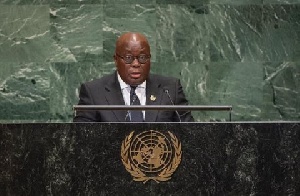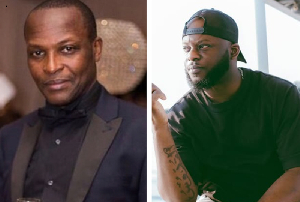President Nana Addo Dankwa Akufo-Addo has said the current trade war between the United States of America (USA) and China has the potential to adversely affect Ghana.
According to the President, even though Ghana was far from these two countries, the inter-dependence of countries across the globe makes it possible for Ghana to feel the spillover effect of the trade war.
President Akufo-Addo, who was addressing world leaders at the 73rd UN General Assembly yesterday in New York, United States of America (USA), therefore, suggested there be an amicable solution to the trade war.
“Madam President, ten years ago as the General Assembly was starting its proceedings, the world was plunged into a financial crisis. The first scenes of that crisis were played out on a street not far from where we are gathered, but the consequences were felt and are still being felt around the world, and in small countries like Ghana.
“Some say that upheaval lies at the heart of the change in politics and outlook around the world. Today, as we speak, a trade war is being stoked between the two largest economies of the world. The consequences will affect those who have had no say, including small countries like Ghana.”
“These events provide proof, if some were needed, that ours is an inter-dependent world,” he added.
According President Akufo-Addo, says the situation where Ghana, like many countries in Africa, is forging relations with China is “not a uniquely Ghanaian or African phenomenon.”
He said “rich and well-established countries have been paying regular visits to China, and seeking to open new economic ties and improve upon existing ones.
With a lot of anxiety is being expressed about the possibility of a recolonisation of the African continent by a new power, President Akufo-Addo admonished all to learn from history.
“It was at the turn of the 20th century that China’s first railways were built by Western companies, financed by Western loans to a nearly bankrupt Qing Dynasty, and it was under those circumstances that a certain strategic port called Hong Kong was leased for 99 years, and the rest as the saying goes, is history,” the President said.
He continued, “Today, the former victim of Western Railways imperialism is lending billions to countries throughout Asia, Africa and Europe to construct not only railroads, but also highways, ports, power plants and other infrastructure, and many businesses.”
The historical echoes, President Akufo-Addo noted, are worrisome, but was confident that “we must and can learn from history.”
Whilst acknowledging that Ghana is getting her population educated and trained, the President noted that, at the same time, “we must address our infrastructural deficit.”
The traditional methods of tackling these problems, he noted, will not provide the answer, as Ghana is looking for new ways to resolve them.
“We, in Ghana, must build roads, bridges, railways, ports, schools, hospitals, and we must create jobs to keep our young people engaged. It is obvious to us that the mode of development trajectory we had been on for many decades is not working. We are trying a different one, and we would appreciate the support and goodwill of the world, especially in helping to stem the huge flow of illicit funds from the continent,” he added.
President Akufo-Addo stressed that it was in everybody’s interest that countries counted amongst the poor of the world make a rapid transformation from poverty to prosperity.
“We are determined in Ghana, and, increasingly, in more and more parts of Africa, to chart our own paths to prosperity, and pay our own way in the world. We are no longer interested in being a burden on others.”
“We will shoulder our own responsibilities and build societies and nations that will be attractive to our youth. We have the necessary sense of enterprise, creativity, innovation and hard work to engineer this transition. Hence, our vision of a Ghana Beyond Aid, indeed, of an Africa Beyond Aid,” he added.
US President, Donald Trump, had promised in his campaign to fix China’s “longtime abuse of the broken international system and unfair practices”.
Starting in January 2018, the US imposed a tariff on solar panel imports, most of which are manufactured in China.
On 6 July, the US specifically targeted China by imposing 25% tariffs on $34 billion of imported Chinese goods as part of Trump’s tariffs policy, which then led China to respond with similarly sized tariffs on U.S. products.
A tariff on an additional $16 billion of Chinese imports was added in mid-August, with China responding proportionately.
A further tariff on $200 billion of Chinese goods is to go into effect on September 24, 2018 to which China plans to respond with tariffs on $60 billion of U.S. goods.
The Trump administration said the tariffs were necessary to protect intellectual property of U.S. businesses, and to help reduce the U.S. trade deficit with China.
General News of Thursday, 27 September 2018
Source: todaygh.com

















